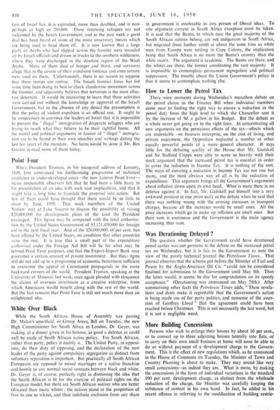White Over Black
While the South African House of Assembly was passing Dr. Malan's apartheid, or Group Areas, Bill on Tuesday, the new High Commissioner for South Africa in London, Dr. Geyer, was making, at a dinner given in his honour, as good a defence as could well be made of South African native policy. For South African, rather than party, policy it mainly is. The United Party, in opposi- tion, do their duty of opposing, and the declaration of the new leader of the party against compulsory segregation as distinct from voluntary separation is important. But practically all South African Europeans are opposed to mixed marriages or a native franchise and hostile to any normal social contacts between black and white. Dr. Geyer is, of course, perfectly right in dismissing the idea that the South African is fit for the exercise of political rights on the European model, but there are South African natives who are better educated than many whites ; the natives stand in the proportion of four to one to whites, and their indefinite exclusion from any share in government is intolerable to any person of liberal ideas. To one argument current in South Africa exception must be taken. It is said that the Bantu, to which race the great majority of the South African natives belong, are not indigenous to South Africa, but migrated from further north at about the same time as white men from Europe were settling in Cape Colony, the implication being that South Africa is no more the Bantu's country than the white man's. The argument is academic. The Bantu are there, and the whites are there, the former constituting the vast majority. It is impossible to contemplate permanent segregation and political suppression. The trouble about the Union Government's policy is that it seems to contemplate nothing else.




































 Previous page
Previous page